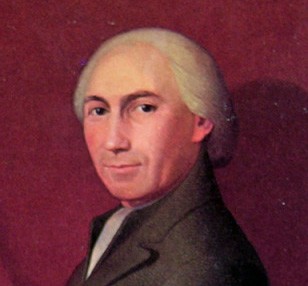
Name: Parson Weems, born Mason Lock Weems
Lived: 1759-1825
Nationality: American
Profession(s): Episcopalian minister, writer
Books: A History of the Life and Death, Virtues and Exploits of General George Washington (1800, expanded 1808), Life of General Francis Marion (1805), Life of Benjamin Franklin (1817); and Life of William Penn (1819)
Perspective: Biographer and hagiographer
Born Mason Lock Weems in Maryland, one of 19 children, after completing school Weems was sent to England to study theology. He was ordained as an Episcopalian minister and returned to Maryland in 1784. Weems spent most his life preaching in Maryland and Virginia. Conflicting reports paint him as either an entertaining storyteller or a dull sermoniser enthralled with the sound of his own voice.
Whatever the reality, Weems found church appointments difficult to obtain so he took up work as a bookseller to supplement his income. Weems also dabbled in writing. His first efforts involved rehashing British Protestant sermons and publishing them under his name. He also penned a series of foreboding moral stories, each with the title “God’s Revenge”.
Though little more than a collection of anecdotes about Washington, glued together with Weems’ fawning praise, in the context Weems’ book proved popular and sold well. He revised it several times, adding new tales and accounts of Washington’s life and leadership, many obtained from interviews with the late president’s extended family. One revision included the famous story, never proven or corroborated, of young Washington admitting to chopping down his father’s cherry true – evidence of Washington’s unflinching honesty.
Another Weems story told of Washington being found deep in prayer at Valley Forge. Still another hinted at Washington’s invincibility, being fired on in battle 17 times by a Native American yet surviving.
Weems’ praise of Washington was so over the top that one contemporary critic called it “fanaticism and absurdity”. Yet at least some of Weems’ apocryphal stories can still be found in contemporary accounts of Washington and his life.
“Washington is gone. Millions are gasping to read something about him. I am nearly primed and cocked for ’em. Six months ago I set myself to collecting anecdotes of him. My plan… I give his history… then I show his unparalleled rise and elevation were owing to his great virtues.”
“When George was about six years old he was made the wealthy master of a hatchet, of which, like most little boys, he was immoderately fond, and was constantly going about chopping every thing that came in his way. One day, in the garden, where he often amused himself hacking his mother’s pea sticks, he unluckily tried the edge of his hatchet on the body of a beautiful young English cherry tree, which he barked so terribly that I don’t believe the tree ever got the better of it. The next morning the old gentleman [Washington’s father], finding out what had befallen his tree… with much warmth asked for the mischievous author… Presently George and his hatchet made their appearance. ‘George’, said his father, ‘do you know who killed that beautiful little cherry tree yonder in the garden?’… Looking at his father with the sweet face of a youth… he bravely cried out, ‘I can’t tell a lie, Pa, you know I can’t tell a lie. I did cut it with my hatchet.”
“It is the private virtues that lay the foundation of all human excellence. Since it was these that exalted Washington to be Columbia’s first and greatest son, be it our first care to present these, in all their lustre, before the admiring eyes of our children.”
“When the children of years to come, hearing his great name re-echoed from every lip, shall say to their fathers, ” What was it that raised Washington to such a height of glory?” let them be told that it was his great talents, constantly guided and guarded by religion.”
“When called by his country in 1775, to lead her freeborn sons against the arms of Britain, what charming modesty, what noble self-distrust, what pious confidence in Heaven, appeared in all his answers.”
“Washington was still more kind and costly in his charities to the minds of the poor. Sensible that a republican government – that is, a government of the people – can never long subsist where the minds of the people are not enlightened, he earnestly recommended it to the citizens of the United States, to promote… institutions for the general diffusion of knowledge. In this, as indeed in all other cases where anything great or good was to be done, Washington led the way.”
“Since the day that God created man on the earth, none ever displayed the power of industry more than did George Washington. Had he, as prince of Wales or as dauphin of France, rendered such great services or attained such immortal honours, it would not have seemed so marvellous in our eyes.”
“Oh admirable man! Oh great preceptor to his country! No wonder everybody honoured him who honoured every body, for the poorest beggar that wrote to him on business was sure to receive a speedy and decisive answer. No wonder everybody loved him who, by his unwearied attention to the public good, manifested the tenderest love for everybody. No wonder that his country delighted to honour him.”
With the exception of material under Quotations, content on this page is © Alpha History 2018-23.
Content created by Alpha History may not be copied, republished or redistributed without our express permission. For more information please refer to our Terms of Use.
